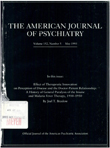The abnormality of normal comparison groups: the identification of psychosis proneness and substance abuse in putatively normal research subjects
Abstract
OBJECTIVE: Careful assessment of research subjects is important because the inclusion of subjects who manifest psychopathology and significant substance abuse in normal comparison groups will decrease statistical and experimental power. The current study evaluated the usefulness of an MMPI-derived algorithm in identifying tendencies toward psychosis and substance abuse in putatively normal research volunteers. METHOD: Ninety-eight adults who were recruited as normal comparison research subjects completed the MMPI, psychiatric interviews, questionnaires, and selected neuropsychological tests. The MMPI classified 81 presumed normal subjects into four subgroups: 1) not psychosis prone/substance abuse not likely, 2) not psychosis prone/substance abuse likely, 3) psychosis prone/substance abuse not likely, and 4) psychosis prone/substance abuse likely. RESULTS: The MMPI psychosis-prone and substance abuse factors identified significantly distressed and dysfunctional individuals with a relatively high degree of accuracy. CONCLUSIONS: It is becoming increasingly apparent that the cursory self- report screening of normal subjects may result in unacceptable levels of psychopathology in comparison groups. The current results also indicate that an adequate substance abuse evaluation is extremely important and that brief self-report information may be misleading. Empirically derived assessment tools, such as the MMPI, may prove useful in allowing researchers to more accurately define control parameters and group membership.
Access content
To read the fulltext, please use one of the options below to sign in or purchase access.- Personal login
- Institutional Login
- Sign in via OpenAthens
- Register for access
-
Please login/register if you wish to pair your device and check access availability.
Not a subscriber?
PsychiatryOnline subscription options offer access to the DSM-5 library, books, journals, CME, and patient resources. This all-in-one virtual library provides psychiatrists and mental health professionals with key resources for diagnosis, treatment, research, and professional development.
Need more help? PsychiatryOnline Customer Service may be reached by emailing [email protected] or by calling 800-368-5777 (in the U.S.) or 703-907-7322 (outside the U.S.).



